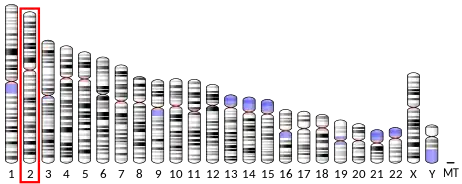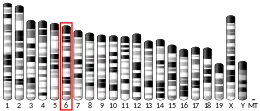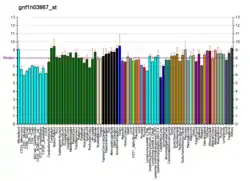REG3G
Regenerating islet-derived protein 3 gamma (also Regenerating islet-derived protein III-gamma) is a protein that in humans is encoded by the REG3G gene.[5][6][7][8]
Intestinal paneth cells produce REG3G (or REG3 gamma) via stimulation of toll-like receptors (TLRs) by pathogen-associated molecular patterns (PAMPs). REG3 gamma specifically targets Gram-positive bacteria because it binds to their surface peptidoglycan layer. It is one of several antimicrobial peptides produced by paneth cells.[9]
Notes and references
- GRCh38: Ensembl release 89: ENSG00000143954 - Ensembl, May 2017
- GRCm38: Ensembl release 89: ENSMUSG00000030017 - Ensembl, May 2017
- "Human PubMed Reference:". National Center for Biotechnology Information, U.S. National Library of Medicine.
- "Mouse PubMed Reference:". National Center for Biotechnology Information, U.S. National Library of Medicine.
- Clark HF, Gurney AL, Abaya E, Baker K, Baldwin D, Brush J, Chen J, Chow B, Chui C, Crowley C, Currell B, Deuel B, Dowd P, Eaton D, Foster J, Grimaldi C, Gu Q, Hass PE, Heldens S, Huang A, Kim HS, Klimowski L, Jin Y, Johnson S, Lee J, Lewis L, Liao D, Mark M, Robbie E, Sanchez C, Schoenfeld J, Seshagiri S, Simmons L, Singh J, Smith V, Stinson J, Vagts A, Vandlen R, Watanabe C, Wieand D, Woods K, Xie MH, Yansura D, Yi S, Yu G, Yuan J, Zhang M, Zhang Z, Goddard A, Wood WI, Godowski P, Gray A (Oct 2003). "The secreted protein discovery initiative (SPDI), a large-scale effort to identify novel human secreted and transmembrane proteins: a bioinformatics assessment". Genome Res. 13 (10): 2265–70. doi:10.1101/gr.1293003. PMC 403697. PMID 12975309.
- Nata K, Liu Y, Xu L, Ikeda T, Akiyama T, Noguchi N, Kawaguchi S, Yamauchi A, Takahashi I, Shervani NJ, Onogawa T, Takasawa S, Okamoto H (September 2004). "Molecular cloning, expression and chromosomal localization of a novel human REG family gene, REG III". Gene. 340 (1): 161–70. doi:10.1016/j.gene.2004.06.010. PMID 15556304.
- Laurine E, Manival X, Montgelard C, Bideau C, Bergé-Lefranc JL, Erard M, Verdier JM (March 2005). "PAP IB, a new member of the Reg gene family: cloning, expression, structural properties, and evolution by gene duplication" (PDF). Biochim. Biophys. Acta. 1727 (3): 177–87. doi:10.1016/j.bbaexp.2005.01.011. PMID 15777617. S2CID 24552883.
- "Entrez Gene: REG3G regenerating islet-derived 3 gamma".
- Abreu MT (February 2010). "Toll-like receptor signalling in the intestinal epithelium: how bacterial recognition shapes intestinal function". Nat. Rev. Immunol. 10 (2): 131–44. doi:10.1038/nri2707. PMID 20098461. S2CID 21789611.
Bibliography
- Hillier LW, Graves TA, Fulton RS, et al. (2005). "Generation and annotation of the DNA sequences of human chromosomes 2 and 4". Nature. 434 (7034): 724–31. Bibcode:2005Natur.434..724H. doi:10.1038/nature03466. PMID 15815621.
- Laurine E, Manival X, Montgelard C, et al. (2005). "PAP IB, a new member of the Reg gene family: cloning, expression, structural properties, and evolution by gene duplication". Biochim. Biophys. Acta. 1727 (3): 177–87. doi:10.1016/j.bbaexp.2005.01.011. PMID 15777617. S2CID 24552883.
- Gerhard DS, Wagner L, Feingold EA, et al. (2004). "The status, quality, and expansion of the NIH full-length cDNA project: the Mammalian Gene Collection (MGC)". Genome Res. 14 (10B): 2121–7. doi:10.1101/gr.2596504. PMC 528928. PMID 15489334.
- Zhang Z, Henzel WJ (2005). "Signal peptide prediction based on analysis of experimentally verified cleavage sites". Protein Sci. 13 (10): 2819–24. doi:10.1110/ps.04682504. PMC 2286551. PMID 15340161.
- Strausberg RL, Feingold EA, Grouse LH, et al. (2003). "Generation and initial analysis of more than 15,000 full-length human and mouse cDNA sequences". Proc. Natl. Acad. Sci. U.S.A. 99 (26): 16899–903. Bibcode:2002PNAS...9916899M. doi:10.1073/pnas.242603899. PMC 139241. PMID 12477932.
- Brandl K, Plitas G, Schnabl B, DeMatteo RP, Pamer EG (2007). "MyD88-mediated signals induce the bactericidal lectin RegIII gamma and protect mice against intestinal Listeria monocytogenes infection". J. Exp. Med. 204 (8): 900–1891. doi:10.1084/jem.20070563. PMC 2118673. PMID 17635956.
This article is issued from Wikipedia. The text is licensed under Creative Commons - Attribution - Sharealike. Additional terms may apply for the media files.




